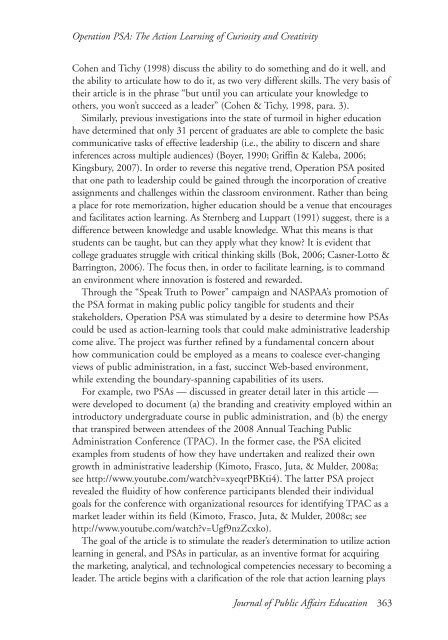JOURNAL OF PUBLIC AFFAIRS EDUCATION - naspaa
JOURNAL OF PUBLIC AFFAIRS EDUCATION - naspaa
JOURNAL OF PUBLIC AFFAIRS EDUCATION - naspaa
Create successful ePaper yourself
Turn your PDF publications into a flip-book with our unique Google optimized e-Paper software.
Operation PSA: The Action Learning of Curiosity and Creativity<br />
Cohen and Tichy (1998) discuss the ability to do something and do it well, and<br />
the ability to articulate how to do it, as two very different skills. The very basis of<br />
their article is in the phrase “but until you can articulate your knowledge to<br />
others, you won’t succeed as a leader” (Cohen & Tichy, 1998, para. 3).<br />
Similarly, previous investigations into the state of turmoil in higher education<br />
have determined that only 31 percent of graduates are able to complete the basic<br />
communicative tasks of effective leadership (i.e., the ability to discern and share<br />
inferences across multiple audiences) (Boyer, 1990; Griffin & Kaleba, 2006;<br />
Kingsbury, 2007). In order to reverse this negative trend, Operation PSA posited<br />
that one path to leadership could be gained through the incorporation of creative<br />
assignments and challenges within the classroom environment. Rather than being<br />
a place for rote memorization, higher education should be a venue that encourages<br />
and facilitates action learning. As Sternberg and Luppart (1991) suggest, there is a<br />
difference between knowledge and usable knowledge. What this means is that<br />
students can be taught, but can they apply what they know It is evident that<br />
college graduates struggle with critical thinking skills (Bok, 2006; Casner-Lotto &<br />
Barrington, 2006). The focus then, in order to facilitate learning, is to command<br />
an environment where innovation is fostered and rewarded.<br />
Through the “Speak Truth to Power” campaign and NASPAA’s promotion of<br />
the PSA format in making public policy tangible for students and their<br />
stakeholders, Operation PSA was stimulated by a desire to determine how PSAs<br />
could be used as action-learning tools that could make administrative leadership<br />
come alive. The project was further refined by a fundamental concern about<br />
how communication could be employed as a means to coalesce ever-changing<br />
views of public administration, in a fast, succinct Web-based environment,<br />
while extending the boundary-spanning capabilities of its users.<br />
For example, two PSAs — discussed in greater detail later in this article —<br />
were developed to document (a) the branding and creativity employed within an<br />
introductory undergraduate course in public administration, and (b) the energy<br />
that transpired between attendees of the 2008 Annual Teaching Public<br />
Administration Conference (TPAC). In the former case, the PSA elicited<br />
examples from students of how they have undertaken and realized their own<br />
growth in administrative leadership (Kimoto, Frasco, Juta, & Mulder, 2008a;<br />
see http://www.youtube.com/watchv=xyeqrPBKti4). The latter PSA project<br />
revealed the fluidity of how conference participants blended their individual<br />
goals for the conference with organizational resources for identifying TPAC as a<br />
market leader within its field (Kimoto, Frasco, Juta, & Mulder, 2008c; see<br />
http://www.youtube.com/watchv=Ugf9nzZcxko).<br />
The goal of the article is to stimulate the reader’s determination to utilize action<br />
learning in general, and PSAs in particular, as an inventive format for acquiring<br />
the marketing, analytical, and technological competencies necessary to becoming a<br />
leader. The article begins with a clarification of the role that action learning plays<br />
Journal of Public Affairs Education 363
















